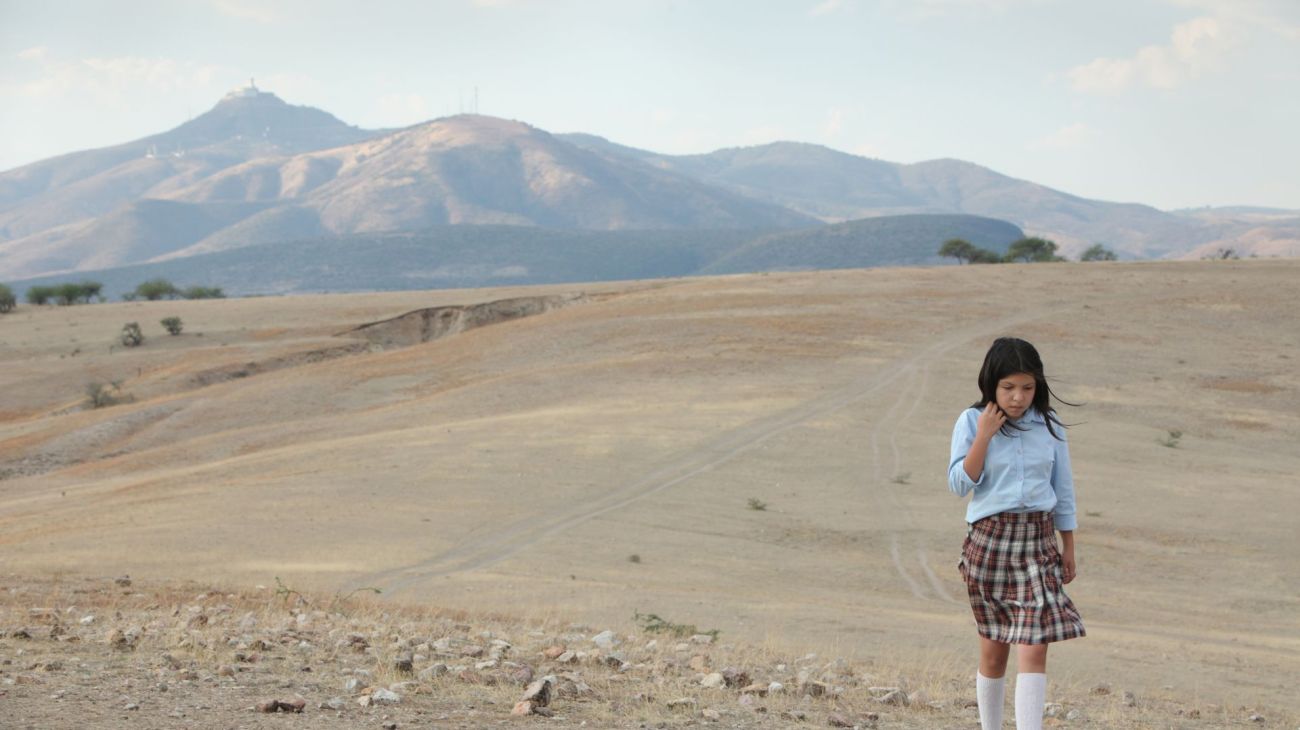
The 49th Chicago International Film Festival
Screens at CIFF: 10/19 & 10/21
World premiere: 16 May, 2013, Cannes International Film Festival
A third of the way through Heli, one might almost inevitably find it a purposeless noodle through the Mexican countryside with scenes that clearly have no connection to each other and random insert shots of things we'll never need to think about again, and that it's shapeless and undisciplined. One would be wrong to think this.
There comes a point where the film very abruptly shifts gears, and from that point the seemingly arbitrary material that has preceded it takes on a very clear meaning, one that you'd really never be able to predict in advance, since the whole point of the shift is to be shocking and arbitrary. I will try not to be coy, without spoiling anything: we spend nearly half of the movie watching a largely aimless slice-of-life drama that soaks in the comings and goings of one family and the people attached to them in a rundown town in the middle of God knows where. The central character is Heli (Armando Espitia), who lives with his father (I'm having a hard time scrounging up the actor's name), his teenage sister, Estela (Andrea Vergara), his wife, Sabrina (Linda González), and their baby. All of which is bluntly communicated in an early scene where Heli chats with a census worker, a sequence that would be kind of hilarious if it wasn't so ballsy of writer-director Amat Escalante and his co-writer Gabriel Reyes) to lay it out there like that. There's a mechanical crudeness to the moment that ends up feeding right into the film's minimalist intensity, and I like that about it.
Estela has a boyfriend, Alberto (Juan Eduardo Palacios) several years older than she is, and he is eager to an unsightly degree to get into her pants. To meet this end, he's used every technique from begging to bragging about his incredible masculinity as a member of the military's training program for young soldiers, where he's exposed to the desperate drug-capturing missions that the government uses to pretend in front of the media that it has some measure of control over the cartels. In the last, he's offered to take her away from all the dusty drudgery of life and bring her to a faraway paradise where they will marry; he does not mention that the money from this will come from the sale of a kilo of uncut cocaine that he stole away from the last drug bust he saw.
To this point, Heli has been so fixedly unfocused that it seems like an accident it was made at all: no scene seems to connect meaningfully to the scenes on either side of it, there are shots and sequences which focus on people or objects that have no bearing on anything else in the rest of the film, nothing that resembles "conflict" or even a "story" that attaches itself to Heli himself, belying the title. Then Alberto hides the drugs in Heli's water tank, and when Heli finds it, investigating a stoppage, he freaks out and destroys it, dumping it in a sinkhole miles away. Problem solved - except that the drugs were stolen by an idiot teenager who didn't bother hiding his tracks, and now a couple of thugs have been sent to teach an object lesson.
The second portion of Heli is so driven and focused and hellbent on depicting the horrific ramifications of Alberto's theft, and then the ramifications of the ramifications, that it's genuinely scary. Also, it becomes impossible to regard the first sequence as being sloppy in any way, because the iron fist that Escalante wields doesn't suggest a director inclined towards idle choices (and does hugely justify his Best Director win at Cannes). The first half of the film, I think, is a Life in the Round sort of deal, creating a grand panorama of organic lives and grace notes, so that when the second half comes along and horribly violates it, the violation hits us, like the best kind of horror (and that's really what's happening here: this is a horror film, all the worse because the horror happens every single day in a large country adjoining the most industrialised nation in the world): the movie itself changes shape to adjust for the brutality that comes along, and that's as upsetting as the actual brutality itself, including one scene that, even were I to describe it, would have all my male readers shift and cross their legs and possible give their crotch a reassuring patch. It involves lighter fluid. And a lighter. And no editing.
If Heli were only a catalogue of violence - and for a solid 20 minutes, it seems like it will be - there'd be no justifying it as more than exceptionally polished and tony torture porn. Eventually, it does turn into something more meaningful and narrative, involving a human anchor to all the misery, and it's that moment where the film turns into great cinema: having dragged us through hell with its characters, it finds some way to declare that there's still life, though it's not really inclined to say that there's "hope", not in the face of all that. The chilly final shot suggests that its characters survive more than find joy and meaning in anything, but that's the bastardly reality of it. And Heli, as dark a movie as you'll find, is a magnificent attempt to throw the audience around like a ragdoll, confront us with that reality that so many people try to ignore (the film doesn't feel pitched to a non-Mexican audience specifically, but certainly to an audience that isn't dealing with the lives of people like its characters daily, or ever), and dare us not to feel shaken by it. A visceral thriller that doubles as a harsh and angry civics lesson, this is pretty terrific stuff, even if it's one of the most unpleasant things I've seen in 2013.
9/10
World premiere: 16 May, 2013, Cannes International Film Festival
A third of the way through Heli, one might almost inevitably find it a purposeless noodle through the Mexican countryside with scenes that clearly have no connection to each other and random insert shots of things we'll never need to think about again, and that it's shapeless and undisciplined. One would be wrong to think this.
There comes a point where the film very abruptly shifts gears, and from that point the seemingly arbitrary material that has preceded it takes on a very clear meaning, one that you'd really never be able to predict in advance, since the whole point of the shift is to be shocking and arbitrary. I will try not to be coy, without spoiling anything: we spend nearly half of the movie watching a largely aimless slice-of-life drama that soaks in the comings and goings of one family and the people attached to them in a rundown town in the middle of God knows where. The central character is Heli (Armando Espitia), who lives with his father (I'm having a hard time scrounging up the actor's name), his teenage sister, Estela (Andrea Vergara), his wife, Sabrina (Linda González), and their baby. All of which is bluntly communicated in an early scene where Heli chats with a census worker, a sequence that would be kind of hilarious if it wasn't so ballsy of writer-director Amat Escalante and his co-writer Gabriel Reyes) to lay it out there like that. There's a mechanical crudeness to the moment that ends up feeding right into the film's minimalist intensity, and I like that about it.
Estela has a boyfriend, Alberto (Juan Eduardo Palacios) several years older than she is, and he is eager to an unsightly degree to get into her pants. To meet this end, he's used every technique from begging to bragging about his incredible masculinity as a member of the military's training program for young soldiers, where he's exposed to the desperate drug-capturing missions that the government uses to pretend in front of the media that it has some measure of control over the cartels. In the last, he's offered to take her away from all the dusty drudgery of life and bring her to a faraway paradise where they will marry; he does not mention that the money from this will come from the sale of a kilo of uncut cocaine that he stole away from the last drug bust he saw.
To this point, Heli has been so fixedly unfocused that it seems like an accident it was made at all: no scene seems to connect meaningfully to the scenes on either side of it, there are shots and sequences which focus on people or objects that have no bearing on anything else in the rest of the film, nothing that resembles "conflict" or even a "story" that attaches itself to Heli himself, belying the title. Then Alberto hides the drugs in Heli's water tank, and when Heli finds it, investigating a stoppage, he freaks out and destroys it, dumping it in a sinkhole miles away. Problem solved - except that the drugs were stolen by an idiot teenager who didn't bother hiding his tracks, and now a couple of thugs have been sent to teach an object lesson.
The second portion of Heli is so driven and focused and hellbent on depicting the horrific ramifications of Alberto's theft, and then the ramifications of the ramifications, that it's genuinely scary. Also, it becomes impossible to regard the first sequence as being sloppy in any way, because the iron fist that Escalante wields doesn't suggest a director inclined towards idle choices (and does hugely justify his Best Director win at Cannes). The first half of the film, I think, is a Life in the Round sort of deal, creating a grand panorama of organic lives and grace notes, so that when the second half comes along and horribly violates it, the violation hits us, like the best kind of horror (and that's really what's happening here: this is a horror film, all the worse because the horror happens every single day in a large country adjoining the most industrialised nation in the world): the movie itself changes shape to adjust for the brutality that comes along, and that's as upsetting as the actual brutality itself, including one scene that, even were I to describe it, would have all my male readers shift and cross their legs and possible give their crotch a reassuring patch. It involves lighter fluid. And a lighter. And no editing.
If Heli were only a catalogue of violence - and for a solid 20 minutes, it seems like it will be - there'd be no justifying it as more than exceptionally polished and tony torture porn. Eventually, it does turn into something more meaningful and narrative, involving a human anchor to all the misery, and it's that moment where the film turns into great cinema: having dragged us through hell with its characters, it finds some way to declare that there's still life, though it's not really inclined to say that there's "hope", not in the face of all that. The chilly final shot suggests that its characters survive more than find joy and meaning in anything, but that's the bastardly reality of it. And Heli, as dark a movie as you'll find, is a magnificent attempt to throw the audience around like a ragdoll, confront us with that reality that so many people try to ignore (the film doesn't feel pitched to a non-Mexican audience specifically, but certainly to an audience that isn't dealing with the lives of people like its characters daily, or ever), and dare us not to feel shaken by it. A visceral thriller that doubles as a harsh and angry civics lesson, this is pretty terrific stuff, even if it's one of the most unpleasant things I've seen in 2013.
9/10






